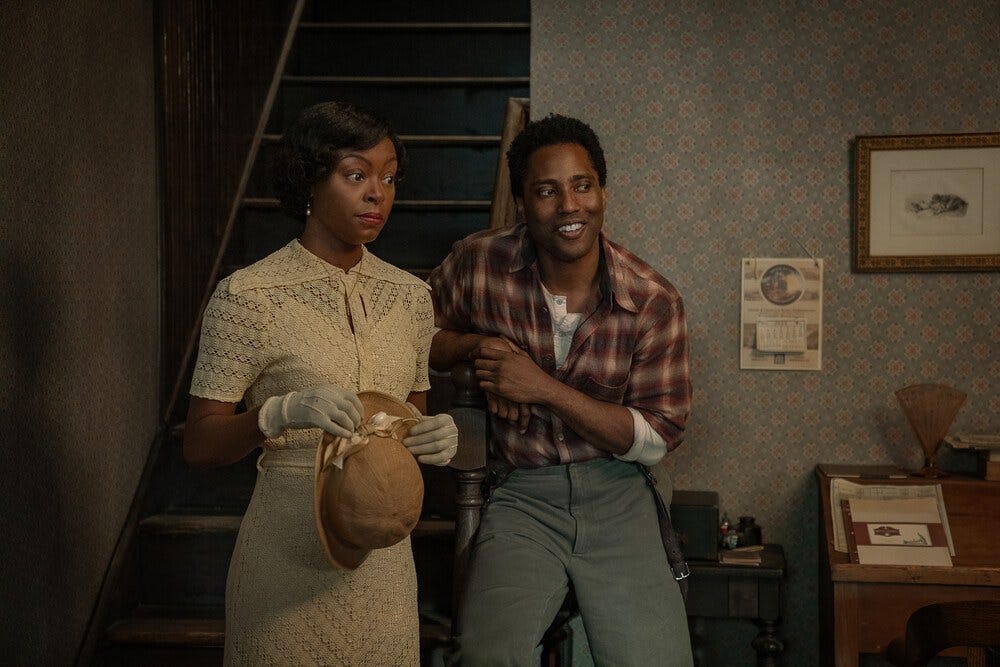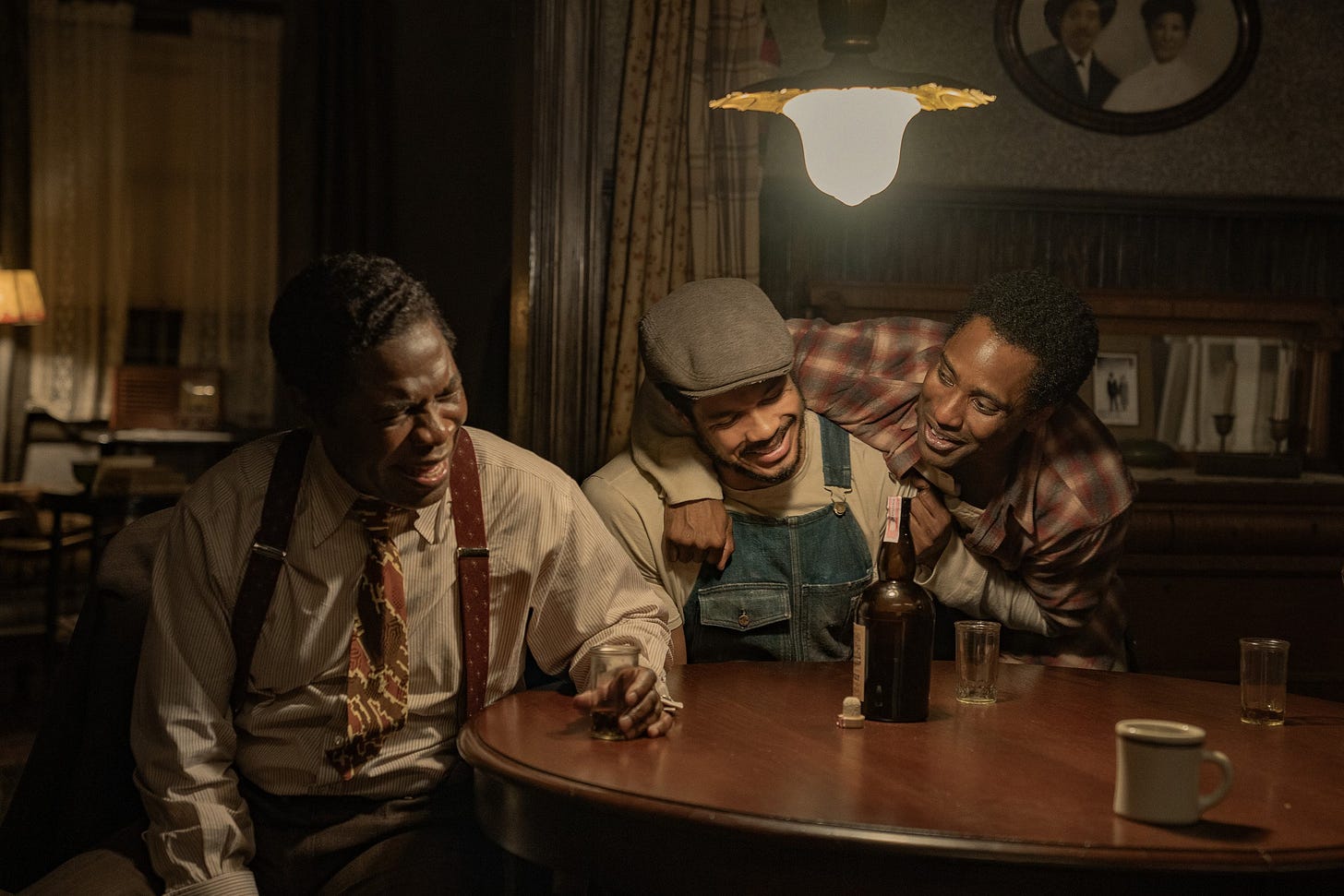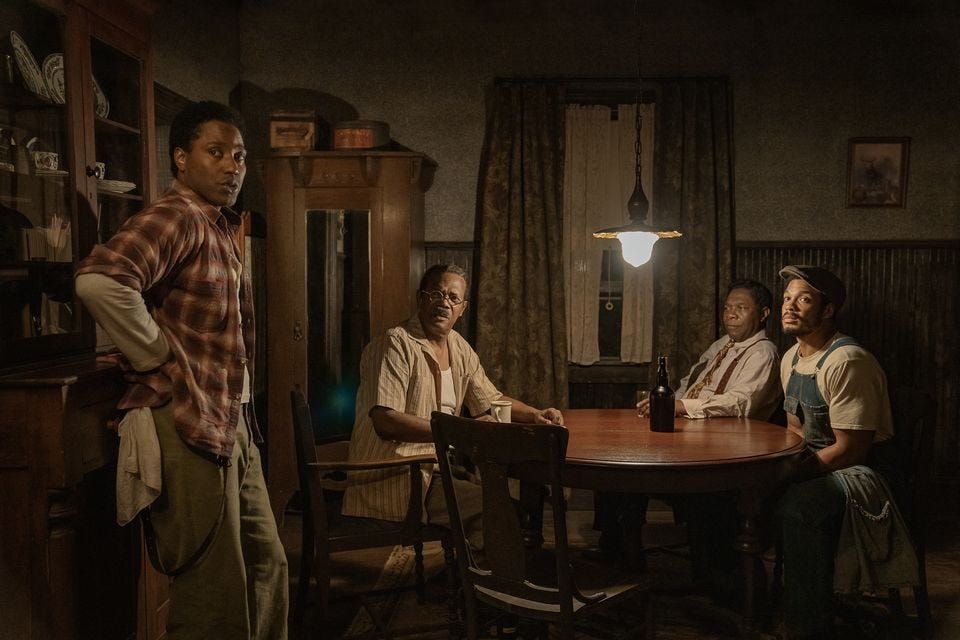The Piano Lesson (2024)
A soul-shaking, not to be missed adaptation of August Wilson's masterful play
Berniece (Danielle Deadwyler) and Boy Willie (John David Washington) dangerously at odds
The Piano Lesson (2024)
In theaters and streaming on Netflix
Filmmakers who adapt a play to the screen are all but obligated to “open it up”. The camera can roam freely, so why confine the action to settings that worked on stage but could feel cramped if they were all an audience saw on screen?
Cracking that nut is a challenge and the filmmakers here have made shrewd choices that intensify the “lesson” they want to impress on us. The action of August Wilson’s Pulitzer Prize 1987 play takes place over a few days in a house in the Hill District of Pittsburgh in 1936.
But this movie’s screenplay starts on a dusty road in Mississippi. Boy Willie (John David Washington) and his longtime friend Lymon (Ray Fisher) struggle to keep their rattletrap cargo truck running. It’s filled with hundreds of watermelons they’re going to sell in Pittsburgh.
We need to see that rickety truck on a narrow country road because it’s more than just shaky transport for fragile produce.
It’s a chariot bearing a payload to Boy Willie’s dreams. In August Wilson’s world, starting out haltingly on a dirt road can open a path to life-changing revelations.
That quiet daring in the screenplay, right off putting a flailing man at the center of a family’s generational combustion, helps make this one of the finest movies of the year and one of the most sure-footed, historically rich Black dramas I’ve ever seen.
Its internecine family fractiousness is electrifying, its cast note-perfect in evoking soul-crushing Black setbacks that Wilson could offer no clear resolutions for. He declined to provide upbeat takeaways, and the movie stays true to his tenacious vision.
Closure about the meaning of one’s past is elusive in Wilson’s view, and sorrow has a way of circling back around when we imagine it’s been banished.
These two scuffling Black men in a creaky truck are in for surprises. In Pittsburgh at 5:00am Boy Willie pounds on the door of the two-story, warmly cluttered home of his uncle, Doaker (Samuel L. Jackson), who’s surprised to see his nephew but greets him warmly.
Another resident is Boy Willie’s sister Berniece (Danielle Deadwyler), and she isn’t overjoyed to find her raucous brother waking her at an ungodly hour. His loud embrace of his uncle and sister doesn’t mollify Berniece. (Lymon, also from the family’s Mississippi home county, politely ambles in.)
She’s not entirely surprised that Boy Willie plans to sell a precious family heirloom, a more than 100-year-old piano tied to the family’s painful antebellum past in bondage, later brought north by the siblings’ mother, Mama Ola, to her brother Doaker’s house.
It’s been more than 17 years since Mama Ola died, and the piano has become for Berniece much more than a keepsake. Her mother treasured its frontispiece and thick legs, the wood intricately carved.
Painstakingly sculpted into the piano’s deep brown mahogany are the faces of ancestors, along with scenes from the bleak years of servitude the family eventually broke free of.
That intricately emblazoned suffering and endurance is precious to Berniece, though she hasn’t played the piano since their mother died. And that may be the strongest reason, Boy Willie insists, for her to welcome the chance to be rid of it.
Since he’s a partial heir to the piano, in his eyes as much owner of it as his sister, he wants to sell it to help make a new future for himself back in Mississippi. She’d get half the proceeds.
To Boy Willie it seems simple. He’s saved one third of what he needs to buy land that’s been promised to him by the offspring of the white landowners who once owned the family’s forebears.
His take from selling the watermelons will give him the second third of what he needs to buy the proffered Mississippi land, and his half of the sale of the piano will give him the final third to complete the purchase price.
He’ll succeed where their struggling father couldn’t. He’ll become a successful landowner, not another man’s means to wealth and standing. As he puts it, “Land is the only thing God’s not making any more of.” Grab it when you can.
Berniece is having none of this. And Wilson, master dramatist, has planted sticks of dynamite to help her keep her promise to Mama Ola not to let the piano go.
One agitator of the family’s unease blows in from Kansas City, Doaker’s pleasure-loving brother Wining Boy (brought to juicy sensual life by Michael Potts). He’s been a rambling piano player, gambler and ladies’ man for three decades.
He brings a freight load of memories. For one, he, Doaker, Boy Willie and Lymon have all spent time in Mississippi’s notorious Parchman Farm prison.
Seated at the dining table, suddenly summoning a memory of harsh times behind bars, he launches into a foot-stomping work song/shout that they all sang at Parchman. “Berta . . . Berta”, they holler, calling up that lost, ideal woman in nearly every troubled man’s past.
Wining Boy, Lymon and Boy Willie share a laugh before bursting in powerful song
The impromptu, chain-gang-like chant/roundelay they all join in on, the words stamped on their weary memories, may be the most stirring testament to Black male endurance I’ve seen onscreen. It was powerful when I saw the play on Broadway, and it’s shattering here. Pain sometimes can’t be named; it has to be cried out in song.
Wining Boy hurls another lightning bolt from the past. During his irregular, unpredictable visits over the years, he’s boisterously played the sacred piano, pounding out wall-shaking numbers from ribald honky-tonk to deep blues.
There comes a moment when he’ll again touch the keys and set off emotions too stark for Berniece to deny.
Wilson has still more trouble in mind for these survivors. Avery (a fine Corey Hawkins, slowing his inflections to suit a man of God) has become in recent years a devout Christian, lately turned preacher, who’s gathering funds to start his own church.
A pastor needs a wife, he proclaims to Berniece and once again pleads with her to marry him.
Again, she says no. It’s been three years since her husband Crawley was killed by police back in Mississippi during a risky venture gone wrong, overseen by none other than Boy Willie.
Crawley brought the gun to the scene that provoked the police to fatally shoot him, but Berniece has never forgiven Boy Willie for luring her husband into a perilous, foolhardy scheme.
Her bitterness spills over in a fit of rage at Boy Willie, further assuring him she’ll never sell the piano. Her protracted mourning for Crawley is also clear evidence, she sadly informs Avery, that she’s not ready to re-marry.
If this turmoil weren’t enough, a terrifying presence has taken up residence in the house. Though Doaker’s sturdy, lived-in dwelling has been a place of at least some solace, lately it’s become haunted.
The invader is Sutter, the Mississippi landowner whose family in generations past were slaveholders who owned the forebears of Doaker, Wining Boy and their late brother.
First to scream after beholding Sutter’s ghost upstairs is Berniece’s young daughter, Maretha (Skylar Aleece Smith). They all believe the girl’s account and anxiously wait to see if the specter will reappear. He does, to a terrified Berniece, and she calls on Avery, God’s anointed, to bless the house and send the apparition away.
Malcolm Washington, in his directing debut, has given his actors enormous emotional freedom. They can all go big, roaring and righteous at any moment, as in life. When the aching truth comes out, Wilson artfully lets it take both speakers and listeners by surprise.
That’s the essence of Wilson’s technique as a dramatist. What you didn’t expect to hear or say can jolt you with the shock you may have sensed in your bones was coming.
Doaker, with surprising calm, confesses that he saw Sutter’s ghost a couple of weeks before. The wraith didn’t speak, so Doaker, ever the family philosopher, has told no one and let the matter percolate. Unlike Berniece, world-weary Doaker isn’t completely taken aback by history’s eruptive reappearances.
Sutter is said to have died by falling down his own well, but Berniece doesn’t believe that portly white property owners fall down their own wells. She’s convinced that Boy Willie pushed Sutter into the well, and that’s why his ghost has followed him to Pittsburgh, seeking retribution.
A healing ceremony, a kind of exorcism, seems essential. Yet despite Avery’s prayerful invocations, the scariest spirits – spawned from the pain we can’t find the strength to face and banish – well up from within.
That rapt conjuring of the supernatural is Wilson is as oracle, overseer and protector of all his characters’ dignity, especially when they’ve lost sight of it.
His rich, rolling cadences when read on the page can at first glance seem more thematic than “dramatic”. The stuff of legend, wisdom snatched from extinction in a perilously close call. His characters never stay long from lamenting loss, painful memories that refuse to die, relationships that couldn’t be mended.
But given its head — allowed to swing — his plays’ incantatory poetic language crackles with tension. His dialogue calls on the actors to be always on edge, keeping at bay the transgressions their characters fear divulging and owning up to. Released at fever pitch, his words can sting like vipers.
That’s why so much of the speech from Wilson’s people is raucous, loud, contrapuntal, contradictory, rowdy, rude, rough and sarcastic. The playwright seems convinced that all of us have to rumble and tussle, be caught off guard, to voice our actual truth.
Boy Willie, Doaker, Wining Boy and Lymon struggle with how Black lives can thrive
These actors let loose with scary, witty, sometimes achingly funny abandon. They all seem to understand that distress — self-protective performance — is built into Wilson’s understanding of Black life. Day or night, in or out of the money, the blues are gonna get you and will stand by to see if you can rise above.
The Piano Lesson on Broadway the night I saw it kept the audience spellbound. Indeed, much of the time one could hear a pin drop. The same ferocious pressure, the anguish that chokes and won’t let these people go, bangs, snarls, sings, laughs and hurtles across the screen here.
Malcolm Washington, in his directing debut, has given his actors enormous emotional freedom. They can all go big, roaring and righteous at any moment, as in life. When the aching truth comes out, Wilson artfully lets it take both speakers and listeners by surprise.
That’s the essence of Wilson’s technique as a dramatist. What you didn’t expect to hear or say can jolt you with the shock that, damn it, you may have sensed in your bones was coming.
John David Washington makes a vivid, headlong dreamer out of Boy Willie, who at age 30 feels his life’s purpose slipping away, pointing him in no clear direction.
Such men are dangerous, Wilson wants us to know, and Berniece’s fear of her brother’s stubbornness seems all too justified in Boy Willie’s heedless tossing of caution to the winds.
Samuel L. Jackson unfussily sinks into Doaker’s strangely unperplexed take on life. Throughout the action, Doaker knows in his gut, as he bluntly tells Boy Willie, that “Berniece is not going to sell that piano.”
But he also realizes that the fracture between the two needs binding up, and their battle over what happens to the piano conceals how much they need each other more than any emblem from the past, however consecrated.
If they’ll bend close to hear it, the piano’s music is about not just the past but the future.
Danielle Deadwyler, so wrenching as the mother of a savagely murdered son in Till (2022), finds a more somber, even chillier, register here for Berniece’s pain.
The loss of Crawley and the burden of raising Maretha alone are taking a toll; her independence, so gallingly thrust upon her, stiffens her will to counter what she sees as Boy Willie’s harebrained scheme to sell the piano and wipe out the sacrifices of their entire lineage.
She won’t stand for it, and Deadwyler’s steel spine as an actress keeps the brother-sister contest thrilling and suspenseful. She refuses to give in to Boy Willie, but we wonder where that immovable stance leaves her. Despite the claims of the past, what hopes in the years to come is she fighting for?
Michael Gioulakis’ cinematography can be gritty and realistic up North (and delightful in some nightclub scenes), yet powerfully evocative showing the violent Southern past. He sensitively lights the wretchedness of Black Mississippians’ homes set ablaze by mobs and enslaved people sold off with cruel indifference.
True to Wilson’s steadfast vision, this movie counts the cost, sometimes leavened with restorative music and laughter, of Black lives tossed to the American wind.
Wilson sings those losses knowing they can’t ever find full restitution. At the same time, he seems to believe, like his people here, that even sorrow, dismay and terror can be redeemed, celebrated.
How is that exactly? Because we’re all teachers if we listen to each other and hear, from deep down, the lessons the past has entrusted to us – and won’t let us sell off.







I subscribed as part of a challenge a few months ago. So glad I did! Your reviews are so enlightening!!! I’m learning so much about the depth of film that I really never appreciated before. Thank you for writing. 💛